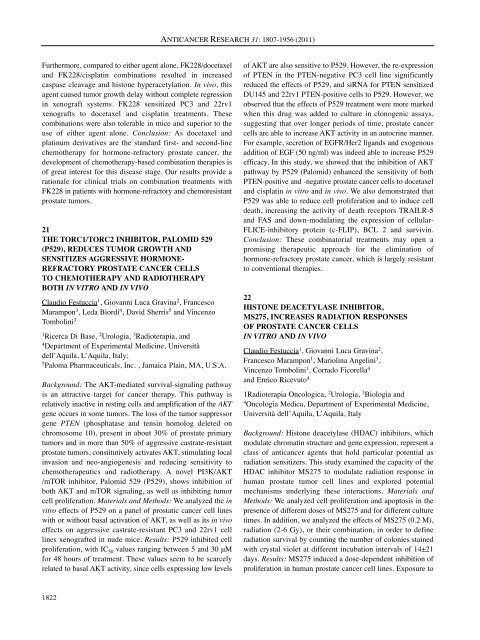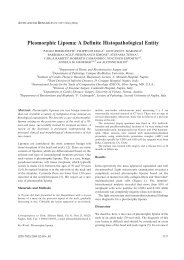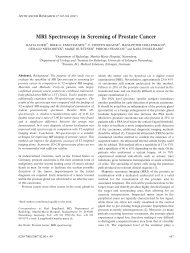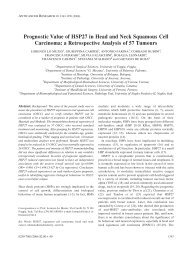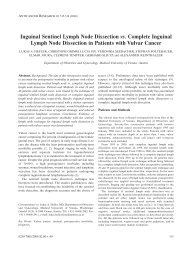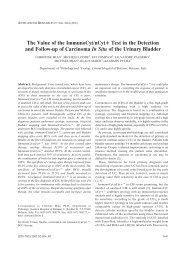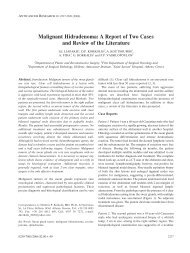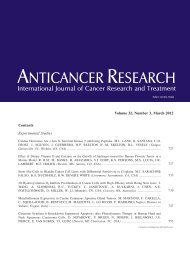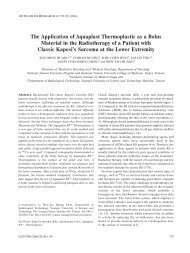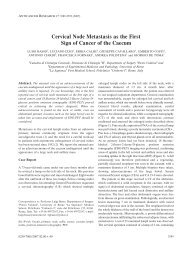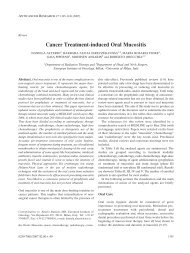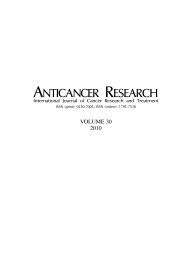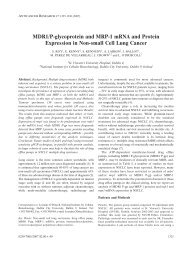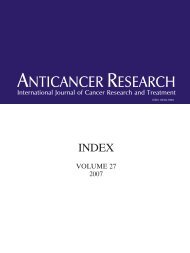ABSTRACTS OF THE 21st ANNUAL MEETING OF THE ITALIAN ...
ABSTRACTS OF THE 21st ANNUAL MEETING OF THE ITALIAN ...
ABSTRACTS OF THE 21st ANNUAL MEETING OF THE ITALIAN ...
You also want an ePaper? Increase the reach of your titles
YUMPU automatically turns print PDFs into web optimized ePapers that Google loves.
Furthermore, compared to either agent alone, FK228/docetaxel<br />
and FK228/cisplatin combinations resulted in increased<br />
caspase cleavage and histone hyperacetylation. In vivo, this<br />
agent caused tumor growth delay without complete regression<br />
in xenograft systems. FK228 sensitized PC3 and 22rv1<br />
xenografts to docetaxel and cisplatin treatments. These<br />
combinations were also tolerable in mice and superior to the<br />
use of either agent alone. Conclusion: As docetaxel and<br />
platinum derivatives are the standard first- and second-line<br />
chemotherapy for hormone-refractory prostate cancer, the<br />
development of chemotherapy-based combination therapies is<br />
of great interest for this disease stage. Our results provide a<br />
rationale for clinical trials on combination treatments with<br />
FK228 in patients with hormone-refractory and chemoresistant<br />
prostate tumors.<br />
21<br />
<strong>THE</strong> TORC1/TORC2 INHIBITOR, PALOMID 529<br />
(P529), REDUCES TUMOR GROWTH AND<br />
SENSITIZES AGGRESSIVE HORMONE-<br />
REFRACTORY PROSTATE CANCER CELLS<br />
TO CHEMO<strong>THE</strong>RAPY AND RADIO<strong>THE</strong>RAPY<br />
BOTH IN VITRO AND IN VIVO<br />
Claudio Festuccia1 , Giovanni Luca Gravina2 , Francesco<br />
Marampon3 , Leda Biordi4 , David Sherris5 and Vincenzo<br />
Tombolini3 1Ricerca Di Base, 2Urologia, 3Radioterapia, and<br />
4Department of Experimental Medicine, Università<br />
dell’Aquila, L’Aquila, Italy;<br />
5Paloma Pharmaceuticals, Inc. , Jamaica Plain, MA, U.S.A.<br />
Background: The AKT-mediated survival-signaling pathway<br />
is an attractive target for cancer therapy. This pathway is<br />
relatively inactive in resting cells and amplification of the AKT<br />
gene occurs in some tumors. The loss of the tumor suppressor<br />
gene PTEN (phosphatase and tensin homolog deleted on<br />
chromosome 10), present in about 30% of prostate primary<br />
tumors and in more than 50% of aggressive castrate-resistant<br />
prostate tumors, constitutively activates AKT, stimulating local<br />
invasion and neo-angiogenesis and reducing sensitivity to<br />
chemotherapeutics and radiotherapy. A novel PI3K/AKT<br />
/mTOR inhibitor, Palomid 529 (P529), shows inhibition of<br />
both AKT and mTOR signaling, as well as inhibiting tumor<br />
cell proliferation. Materials and Methods: We analyzed the in<br />
vitro effects of P529 on a panel of prostatic cancer cell lines<br />
with or without basal activation of AKT, as well as its in vivo<br />
effects on aggressive castrate-resistant PC3 and 22rv1 cell<br />
lines xenografted in nude mice. Results: P529 inhibited cell<br />
proliferation, with IC 50 values ranging between 5 and 30 μM<br />
for 48 hours of treatment. These values seem to be scarcely<br />
related to basal AKT activity, since cells expressing low levels<br />
1822<br />
ANTICANCER RESEARCH 31: 1807-1956 (2011)<br />
of AKT are also sensitive to P529. However, the re-expression<br />
of PTEN in the PTEN-negative PC3 cell line significantly<br />
reduced the effects of P529, and siRNA for PTEN sensitized<br />
DU145 and 22rv1 PTEN-positive cells to P529. However, we<br />
observed that the effects of P529 treatment were more marked<br />
when this drug was added to culture in clonogenic assays,<br />
suggesting that over longer periods of time, prostate cancer<br />
cells are able to increase AKT activity in an autocrine manner.<br />
For example, secretion of EGFR/Her2 ligands and exogenous<br />
addition of EGF (50 ng/ml) was indeed able to increase P529<br />
efficacy. In this study, we showed that the inhibition of AKT<br />
pathway by P529 (Palomid) enhanced the sensitivity of both<br />
PTEN-positive and -negative prostate cancer cells to docetaxel<br />
and cisplatin in vitro and in vivo. We also demonstrated that<br />
P529 was able to reduce cell proliferation and to induce cell<br />
death, increasing the activity of death receptors TRAILR-5<br />
and FAS and down-modulating the expression of cellular-<br />
FLICE-inhibitory protein (c-FLIP), BCL 2 and survivin.<br />
Conclusion: These combinatorial treatments may open a<br />
promising therapeutic approach for the elimination of<br />
hormone-refractory prostate cancer, which is largely resistant<br />
to conventional therapies.<br />
22<br />
HISTONE DEACETYLASE INHIBITOR,<br />
MS275, INCREASES RADIATION RESPONSES<br />
<strong>OF</strong> PROSTATE CANCER CELLS<br />
IN VITRO AND IN VIVO<br />
Claudio Festuccia 1 , Giovanni Luca Gravina 2 ,<br />
Francesco Marampon 1 , Mariolina Angelini 3 ,<br />
Vincenzo Tombolini 1 , Corrado Ficorella 4<br />
and Enrico Ricevuto 4<br />
1Radioterapia Oncologica, 2 Urologia, 3 Biologia and<br />
4 Oncologia Medica, Department of Experimental Medicine,<br />
Università dell’Aquila, L’Aquila, Italy<br />
Background: Histone deacetylase (HDAC) inhibitors, which<br />
modulate chromatin structure and gene expression, represent a<br />
class of anticancer agents that hold particular potential as<br />
radiation sensitizers. This study examined the capacity of the<br />
HDAC inhibitor MS275 to modulate radiation response in<br />
human prostate tumor cell lines and explored potential<br />
mechanisms underlying these interactions. Materials and<br />
Methods: We analyzed cell proliferation and apoptosis in the<br />
presence of different doses of MS275 and for different culture<br />
times. In addition, we analyzed the effects of MS275 (0.2 M),<br />
radiation (2-6 Gy), or their combination, in order to define<br />
radiation survival by counting the number of colonies stained<br />
with crystal violet at different incubation intervals of 14±21<br />
days. Results: MS275 induced a dose-dependent inhibition of<br />
proliferation in human prostate cancer cell lines. Exposure to


